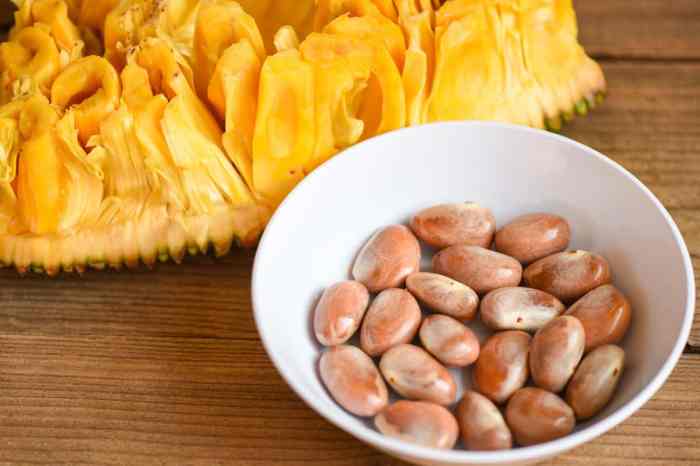Can You Plant Jackfruit Seeds?
Growing Jackfruit from Seed: Can You Plant Jackfruit Seeds
Can you plant jackfruit seeds – Cultivating jackfruit from seed offers a rewarding experience, allowing you to nurture a tree from its earliest stages. This guide provides a comprehensive overview of the process, from seed germination to seedling care and beyond, equipping you with the knowledge to successfully grow your own jackfruit tree.
Jackfruit Seed Germination Process
Successful jackfruit seed germination hinges on several key factors: proper seed preparation, ideal environmental conditions, and consistent care. The process generally involves cleaning the seeds, preparing a suitable medium, and providing the right temperature and humidity.
Steps Involved in Germination:
- Seed Selection and Cleaning: Choose ripe, healthy jackfruit seeds. Thoroughly clean them, removing any remaining fruit pulp to prevent fungal growth. Gently scrub with a soft brush and rinse thoroughly.
- Pre-treatment (Optional): Soaking the seeds in water for 12-24 hours can improve germination rates. Some growers also recommend scarification (gently nicking the seed coat) to aid water absorption.
- Planting Medium: Use a well-draining mix, such as a combination of potting soil, perlite, and vermiculite. Avoid overly compacted soil.
- Planting: Sow seeds about 1 inch deep, ensuring proper spacing. Keep the soil consistently moist but not waterlogged.
- Environmental Conditions: Maintain a warm temperature (75-85°F) and high humidity (around 70%). Adequate indirect sunlight is beneficial.
Comparison of Germination Methods:
| Germination Method | Advantages | Disadvantages | Success Rate |
|---|---|---|---|
| Direct Sowing | Simpler, less handling of seedlings | Higher risk of seed predation, slower growth | Moderate |
| Starting Indoors (Containers) | Better control over environment, higher survival rate | Requires more effort, potential for transplant shock | High |
| Soaking Seeds | Improves germination rate | May increase risk of fungal growth if not handled properly | High |
| Scarification | Aids water absorption and speeds up germination | Can damage seeds if done improperly | Moderate to High |
Ideal Soil and Planting Medium for Jackfruit
The choice of soil and planting medium significantly impacts the success of jackfruit cultivation. Well-draining soil with the right pH is crucial for healthy root development and nutrient uptake.
Ideal Soil Type and pH: Jackfruit thrives in slightly acidic to neutral soil with a pH range of 6.0 to 7.0. Sandy loam or clay loam soils that are well-drained are preferred. Avoid waterlogged or compacted soil.
Planting Mediums: A well-draining potting mix, often a blend of peat moss, perlite, and vermiculite, is ideal for starting seeds indoors. Garden soil can be used for direct sowing, but amending it with organic matter to improve drainage and aeration is beneficial.
Nutrient Requirements: Jackfruit seedlings have higher nutrient demands compared to mature trees, particularly for nitrogen and phosphorus during the early growth stages. Mature trees require balanced nutrition, but excessive nitrogen can lead to vegetative growth at the expense of fruiting.
Optimal Soil Composition Diagram: Imagine a pie chart. Approximately 50% would be composed of well-drained soil (sandy loam or clay loam), 30% compost or well-rotted manure, and 20% perlite or similar material for improved aeration and drainage.
Jackfruit Planting Methods and Techniques

Source: cpcdn.com
Several techniques can be employed for planting jackfruit seeds, each with its advantages and disadvantages. Direct sowing simplifies the process, while transplanting offers better control over seedling development.
Direct Sowing: Plant seeds directly into the ground in a prepared bed. This method is suitable for warmer climates and areas with minimal risk of frost.
Transplanting: Start seeds indoors in containers and then transplant seedlings outdoors once they are established. This allows for better control over environmental conditions and reduces the risk of seedling loss.
Planting in Containers vs. Ground: Container planting provides greater control over watering, fertilization, and pest management. Direct ground planting offers the advantage of unrestricted root growth, but requires more attention to soil preparation and environmental factors.
Common Mistakes to Avoid: Overwatering, planting seeds too deep, poor soil drainage, and inadequate sunlight are common pitfalls to avoid.
Proper Depth and Spacing: Plant seeds approximately 1 inch deep. Space seedlings 3-4 feet apart to allow for adequate growth.
Jackfruit Seedling Care and Maintenance, Can you plant jackfruit seeds

Source: gardentabs.com
Consistent watering, appropriate fertilization, and regular maintenance are essential for healthy jackfruit seedling development. Prompt attention to potential problems can prevent significant setbacks.
Watering and Fertilization: Keep the soil consistently moist but not waterlogged. Use a balanced fertilizer during the growing season, following the manufacturer’s instructions. Avoid over-fertilizing.
Signs of Seedling Problems: Wilting, yellowing leaves, stunted growth, and the presence of pests or diseases indicate potential problems.
Regular Maintenance Schedule: Weed regularly, prune to maintain shape and remove dead or damaged branches, and implement pest control measures as needed.
Protecting Seedlings from Extreme Weather: Provide shade during periods of intense heat and protect seedlings from frost using appropriate coverings.
Jackfruit Seedling Growth and Development

Source: gardeningaction.com
Understanding the typical growth stages of a jackfruit seedling helps you anticipate developmental milestones and address potential issues proactively.
Typical Growth Stages: Germination, initial leaf development, stem elongation, branching, and the eventual development of a mature tree.
Characteristics of a Healthy Seedling: Vigorous growth, deep green leaves, and a strong, healthy root system.
Factors Influencing Growth Rate: Sunlight, water availability, nutrient levels, and temperature significantly impact growth rate.
Mature Jackfruit Tree Description:
A mature jackfruit tree can reach heights of 30-60 feet, developing a broad, spreading crown. The leaves are large, oblong, and leathery, typically 1-2 feet long. The bark is rough and grayish-brown. The tree produces large, pendulous fruits, which can weigh up to 80 pounds.
Potential Challenges and Solutions When Growing Jackfruit
Several challenges can arise during jackfruit cultivation, ranging from pest infestations to environmental stresses. Early identification and prompt action are crucial for mitigating potential losses.
Common Challenges: Pests (e.g., insects, mites), diseases (e.g., fungal infections), nutrient deficiencies, and extreme weather conditions.
Prevention and Management Strategies: Regular inspection, appropriate pest and disease control measures, proper fertilization, and environmental protection.
Troubleshooting Common Problems: Accurate diagnosis of the problem is key to selecting the right solution. This often involves careful observation of symptoms.
| Problem | Cause | Symptoms | Solution |
|---|---|---|---|
| Root Rot | Poor drainage, overwatering | Wilting, yellowing leaves, soft or mushy roots | Improve drainage, adjust watering, treat with fungicide |
| Nutrient Deficiency | Lack of essential nutrients | Yellowing or discolored leaves, stunted growth | Apply appropriate fertilizer |
| Pest Infestation | Insects, mites | Damaged leaves, presence of pests | Use appropriate insecticides or natural pest control methods |
| Sun Scald | Intense sunlight | Burned or scorched leaves | Provide shade during peak sun hours |
FAQ Resource
How long does it take for a jackfruit seed to germinate?
Germination time varies, but generally takes between 2-4 weeks under ideal conditions.
Can I use any type of soil for planting jackfruit seeds?
No, well-draining soil rich in organic matter is essential. Avoid heavy clay soils.
What are the signs of a healthy jackfruit seedling?
Healthy seedlings exhibit vibrant green leaves, strong stems, and consistent growth.
How often should I water jackfruit seedlings?
Yes, you can definitely plant jackfruit seeds; it’s a straightforward process. The success rate, however, depends on various factors, much like establishing a lawn, where you might wonder, “can you plant grass seed over weeds?” A related challenge involves soil preparation; similar considerations apply when researching whether can you plant grass seed over weeds , and ensuring proper soil conditions is crucial for both jackfruit and grass seed germination.
Ultimately, successful planting hinges on understanding the specific needs of the plant.
Water regularly, keeping the soil consistently moist but not waterlogged. Adjust watering frequency based on weather conditions.





















